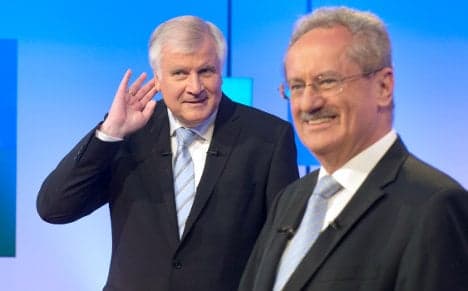Bavaria warms up for election with TV fight

As Bavaria prepares for its state election next Sunday, the main candidates fought it out in a televised debate, with the Social Democrat challenger performing better than expected against the conservative incumbent.
State premier Horst Seehofer's usual punchy style failed to put off his challenger, Munich Mayor Christian Ude, who landed a number of blows, and was generally perceived as having performed well.
But while it might pump up his party faithful, Ude's result is unlikely to be enough to make a big difference to the ultimate result. A poll released on Tuesday showed Seehofer's Christian Social Union (CSU) heading towards 47 percent and the Social Democrats (SPD) looking at 18 percent in Bavaria.
The CSU's coalition partner the pro-business Free Democrats (FDP) were expected to get five percent, while the Greens, which could partner the SPD, were on 13 percent.
The inescapable reality of Bavarian politics is that it would take an earthquake - probably a real one rather than an electoral one - to shift the CSU from power on September 15th.
The question is whether Seehofer can achieve a majority without the help of the FDP and rule alone.
Such a result might be a relief for both the CSU and the FDP who are at times uneasy bedfellows due to the CSU's socially conservative instincts, which can clash with the FDP's economic liberalism.
For example, Seehofer remained insistent during the Wednesday evening debate that he would push for a tax for foreign vehicles on Bavarian motorways, despite Merkel's dismissal of the idea on Sunday evening.
This also earned criticism from the Free Democrats on Thursday, with their main national candidate Rainer Brüderle saying. "What Mr Seehofer wants is just not possible."
A ruling majority for Seehofer would not only be a personal victory but would also further strengthen the CSU's position within Merkel's conservative bloc. They are the more socially conservative arm of the bloc, and punch above their representative weight in terms of ministerial appointments.
The CSU forced Merkel to adopt for example, the controversial child care funding system which offers money to parents who do not send their under-threes to state-funded kindergarten. It was widely derided as a measure which would discourage women from returning to work after having children. The money would be better spent on improving child care facilities, opponents argued, but even a reluctant Merkel was forced by the CSU to adopt the policy.
Were a strengthened CSU to be combined with a weakened CDU after the September 22 general election, it could skew the flavour of the largest bloc in parliament, and most likely, in any ruling coalition.
READ MORE: Bavarian leader wants foreigners to pay for autobahns
Hannah Cleaver
Comments
See Also
State premier Horst Seehofer's usual punchy style failed to put off his challenger, Munich Mayor Christian Ude, who landed a number of blows, and was generally perceived as having performed well.
But while it might pump up his party faithful, Ude's result is unlikely to be enough to make a big difference to the ultimate result. A poll released on Tuesday showed Seehofer's Christian Social Union (CSU) heading towards 47 percent and the Social Democrats (SPD) looking at 18 percent in Bavaria.
The CSU's coalition partner the pro-business Free Democrats (FDP) were expected to get five percent, while the Greens, which could partner the SPD, were on 13 percent.
The inescapable reality of Bavarian politics is that it would take an earthquake - probably a real one rather than an electoral one - to shift the CSU from power on September 15th.
The question is whether Seehofer can achieve a majority without the help of the FDP and rule alone.
Such a result might be a relief for both the CSU and the FDP who are at times uneasy bedfellows due to the CSU's socially conservative instincts, which can clash with the FDP's economic liberalism.
For example, Seehofer remained insistent during the Wednesday evening debate that he would push for a tax for foreign vehicles on Bavarian motorways, despite Merkel's dismissal of the idea on Sunday evening.
This also earned criticism from the Free Democrats on Thursday, with their main national candidate Rainer Brüderle saying. "What Mr Seehofer wants is just not possible."
A ruling majority for Seehofer would not only be a personal victory but would also further strengthen the CSU's position within Merkel's conservative bloc. They are the more socially conservative arm of the bloc, and punch above their representative weight in terms of ministerial appointments.
The CSU forced Merkel to adopt for example, the controversial child care funding system which offers money to parents who do not send their under-threes to state-funded kindergarten. It was widely derided as a measure which would discourage women from returning to work after having children. The money would be better spent on improving child care facilities, opponents argued, but even a reluctant Merkel was forced by the CSU to adopt the policy.
Were a strengthened CSU to be combined with a weakened CDU after the September 22 general election, it could skew the flavour of the largest bloc in parliament, and most likely, in any ruling coalition.
READ MORE: Bavarian leader wants foreigners to pay for autobahns
Hannah Cleaver
Join the conversation in our comments section below. Share your own views and experience and if you have a question or suggestion for our journalists then email us at [email protected].
Please keep comments civil, constructive and on topic – and make sure to read our terms of use before getting involved.
Please log in here to leave a comment.